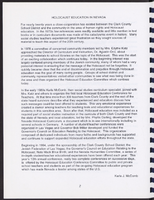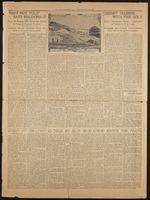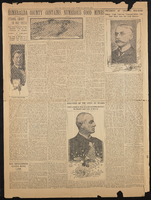Search the Special Collections and Archives Portal
Search Results

Transcript of interview with Mary Kreuzer by Patricia Kohlman, December 15, 1975
Date
Archival Collection
Description
On December 15, 1975, Patricia Kohlman interviewed Mary Kreuzer (born 1923 in Las Vegas, Nevada) in her home in Las Vegas. The two discuss Kreuzer’s childhood, as well as the different addresses that she’s lived at in Las Vegas. The interview concludes with a discussion on entertainment and small businesses before the population boom in Southern Nevada.
Text

Transcript of interview of Thalia Dondero by Mary Germain, March 13, 1976
Date
Archival Collection
Description
On March 13, 1976, Mary Germain interviewed Thalia Dondero (born 1921 in Greeley, Colorado) about her life in Nevada and her experiences as the first female commissioner for the Clark County Commission. Dondero first talks about her upbringing and her eventual move to Southern Nevada. She also discusses her involvement in extracurricular activities, such as being a leader for the Girl Scouts, and how some of those experiences led her to get involved in politics. Dondero also mentions her work with National Geographic and her passion for working with oil paintings and watercolors. The final part of the interview involves some of Dondero’s accounts as a commissioner for Clark County and some of the challenges she has faced in that position.
Text

Transcript of interview with Don Eckert by Robert A. Kamp, March 15, 1981
Date
Archival Collection
Description
On March 15, 1981, Robert A. Kamp interviewed Donald (Don) L. Eckert (born 1953 in Las Vegas, Nevada) about his experiences while living in Nevada. Eckert first explains the geographical boundaries of Las Vegas when he was first born and the types of recreation in which both youth and adults would take part. Eckert then discusses the Helldorado events and how they have changed over the years before describing how the University of Nevada, Las Vegas has changed as well. The interview then shifts to the topic of Eckert’s college major, hotel management, and then to a brief discussion about the MGM fire. Eckert also talks about horse racing in Las Vegas, changes in gaming, the Basic Magnesium plant, and the development of Mount Charleston. The interview concludes with Eckert’s thoughts on the legalization of gambling in other states and how that trend relates to the future of Las Vegas.
Text

Laura Gentry interview, February 26, 1977: transcript
Date
Archival Collection
Description
On February 26, 1977, collector Harold May interviewed Laura Gentry (born May 1897 in St. Thomas, Nevada) at her cabin in Gold Butte, Nevada. In this interview, Laura Gentry discusses living in St. Thomas and Overton, Nevada. She discusses the development of the Overton and Gold Butte areas of Nevada as well as the people involved in mining in these areas.
Text

Transcript of interview with Fred Gibson by Maisie Gibson, March 9, 1975
Date
Archival Collection
Description
On March 9, 1975, Maisie Gibson interviewed Fred Gibson (born 1927 in Golden, Colorado) about his life in Nevada. Gibson first talks about his family’s background, their move to Nevada, and his education in early Las Vegas schools. He also mentions his service in the U.S. Army, his college education, and his occupation as an engineer at various companies. Gibson then talks about the various locations at which he has lived, his membership in clubs and charitable organizations, and his memories of the first properties on Fremont Street as well as those of the Helldorado Parade. The interview then covers the topics of mining, the atomic testing, economic and environmental changes, and social changes. The interview concludes with a discussion on the growth and development of Henderson, Nevada.
Text

Transcript of interview with Elbert Edwards by Layne Covington, October 16, 1986
Date
Archival Collection
Description
On October 16, 1986, Layne Covington interviewed Elbert Edwards (born 1907 in Panaca, Nevada) about his life in Southern Nevada. Edwards first talks about his family background before talking about what it was like to live in Panaca. He then talks about changes in Southern Nevada, particularly those in Boulder City that have taken place over time. Edwards later talks about the work of his wife and both of their political involvement and his involvement and career in education. The latter part of the interview includes discussion of the building of Boulder Dam, Edwards’ job as a registrar in the Selective Service, and the effects that the war years had on Las Vegas.
Text

Holocaust Education Conference program, 1997
Date
Archival Collection
Description
Booklet program from the Holocaust Education Conference, 1997.
Text



